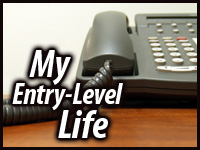 So, let’s say that you’ve created your résumé and reference list, you’ve been networking, and you’ve finally landed a job interview. Congrats to you! Now, it’s time for you to meet with a potential employer and tell them why you’re amazing and why they should hire you.
So, let’s say that you’ve created your résumé and reference list, you’ve been networking, and you’ve finally landed a job interview. Congrats to you! Now, it’s time for you to meet with a potential employer and tell them why you’re amazing and why they should hire you.
Making a good first impression is important – you never get a second chance at it. A first impression is made within a matter of seconds, so a potential employer will begin making assumptions about job candidates from the moment they step foot in the door.
Because of that, you need to be sending the right message at all times. To help you make the most of your interview, keep in mind this list of what NOT to do during an interview.
Don’t arrive late. The employer is taking time out of his day to sit down and meet with you. It’s vital that you honor that time – it’s a sign of respect. An employer doesn’t want to hear that you got stuck in traffic or that you couldn’t find your favorite dress shoes. If he sets a time for you to be there, make sure you’re there. It’s a good idea to arrive about 15 minutes early.
Don’t dress to un-impress. You might live in jeans every day of your life, but don’t wear them to a job interview. Put some thought into your wardrobe and dress to impress your interviewer. Showing up to an interview looking like you just rolled out of bed will probably not score you any bonus points.
Don’t talk on your phone. When you get to the lobby of the employer’s office, turn off your phone. This way it won’t accidentally ring during your interview, and you won’t feel compelled to constantly check it to see if you’ve missed any calls. And even though you might have some time to spare while waiting to meet with the employer, it’s not a good idea to call your best friend and discuss your plans for the evening. You are being evaluated from the moment you arrive.
Don’t chew gum. Your goal during an interview is to come across as polished and professional. Spit your gum out before you get to the interview site.
Don’t appear bored. During an interview, a potential employer wants to know your thoughts and wants to find out what you know. Don’t just answer with “yes” or “no” responses. Elaborate on your answers, and demonstrate that you’re interested and knowledgeable about the company and its industry.
Don’t get too comfortable. The interviewer’s office is not your house, so don’t act like it. Don’t slouch in your chair or kick your feet up. These actions give the impression that you’re disrespectful or that you already think you’ve got the job. Instead, sit up straight on the edge of your chair and be interested in the conversation.
Don’t talk negatively about the past. An employer doesn’t want to hear why you didn’t get along with an intern supervisor or hear you disrespect anyone you’ve worked with. Talking negatively about others will quickly lower your credibility and likeability.
Don’t provide TMI. Too much information about yourself is a no-no. For example, it’s OK to share basic info about yourself in how you respond to questions, but don’t go into drastic detail revealing everything about your personal life. Also, don’t talk about your financial situation, what health problems you have, or other sensitive topics. Be friendly and conversational, but don’t go overboard with the info.
Don’t lie. An employer can easily find out if you’re lying during an interview by checking your references. If you’re asked if you know how to do a certain task and you don’t, tell the truth. It’s better to be honest about your skills, because you don’t want to promise you can do something and then not be able to deliver if you’re hired.
Don’t have an all-about-me attitude. Yes, an interview is focused on you and what skills you can bring to their company, but an employer also likes to know why you’re interested in his business. Tell the interviewer some interesting facts you know about the company. Ask questions about how the job you’re interviewing for brings value to their business. Coming to the interview prepared shows you’re interested in the job and have done your homework to prepare for the interview.
With your résumé in hand, a list of references, a smile, and these tips, you’re ready for your next interview. Keep these tips in mind, because knowing what not to do will allow you to stay focused on making a great first impression.
Want to read about some more interview do’s and don’ts?
4 Job Interview Musts
3 Tips for Interviewing with a Staffing Company
Responding to the Top 7 Interview Questions
Standing Out in the Interview: What Your Hobbies Could Say About You
Also, check out this Careerbuilder Article for some funny examples of interviews gone wrong.



